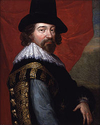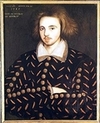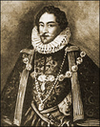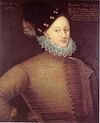

Shakspur of Stratford-on-Avon Sir Francis Bacon Christopher Marlowe Roger Manners, Fifth Earl of Rutland Edward de Vere, Seventeenth Earl of Oxford William Stanley, Sixth Earl of Derby Group Theories
Note: I use the masculine "he" and "him" when referring to the unknown author of the works of Shake-speare because I find the most convincing candidates to be men. I know that the brilliant Mary Sidney, Countess of Pembroke, and the inevitable Queen Elizabeth have been proposed by a few, but I don't find their cases at all convincing.


When I first heard of "the authorship controversy", it was stated that the quality of Shakspur's signatures indicated a low level of literacy, and also that the plays must be the work of an aristocrat. I thought the first argument ridiculous, as many people have poor signatures, and the second argument I considered simply a remnant of the foolish belief in the superiority of the nobility.
When I saw copies of Shakspur's signatures, however, I immediately got the point, and for the first time, became suspicious. The signatures are not sloppy, they are crude, uncertain, like someone learning to write their name. As for the second point, I simply had not understood the argument: It is not that only a mind bred for nobility could be the great playwright, but rather that the point-of-view of the author is from the nobility or aristocracy of the time. In fact it was this that led the great democrat Walt Whitman, a lover of Shake-speare, to doubt their origin from a commoner and to propose instead "one of the wolvish Earls".[1]

 I have the greatest respect for Bacon, but do not feel he was the
author of the works of Shake-speare. His inclination was the cool
world of intellect, not the volatile world of emotion. He was
also very ambitious. If the author of Shake-speare was as
self-effacing as he must have been to remain unknown, Bacon does
not seem a likely possibility. In fact, if the reason the author
hid behind a pseudonym had to do with his noble birth, Bacon is
disqualified.
I have the greatest respect for Bacon, but do not feel he was the
author of the works of Shake-speare. His inclination was the cool
world of intellect, not the volatile world of emotion. He was
also very ambitious. If the author of Shake-speare was as
self-effacing as he must have been to remain unknown, Bacon does
not seem a likely possibility. In fact, if the reason the author
hid behind a pseudonym had to do with his noble birth, Bacon is
disqualified.
The result is that people who want to believe it was Bacon are led to propose elaborate theories, including the idea that Bacon was the son of Queen Elizabeth, and that the works of Shake-speare are written in code. Nonetheless, Bacon is interesting in relation to the authorship question. He may well have had a role, due to his position, learning, and vision. In any case, it is hard to believe he would not have known who the author was.

 Marlowe was dead when most of Shake-speare was written, despite
the denials of some. His corpse was witnessed by many who
knew him. So again, those who want to believe, in this case
in Marlowe as author, are led to extreme theories including
his faking his death and so on. If he did not die then, he was
in disguise, and so Marlovians are allowed endless speculation
without the possibility of checking facts: Marlowe could have
been anywhere, done anything, even been almost
anyone.
Marlowe was a powerful writer but again, of a very different
temperament to the author of Shake-speare.
Marlowe was dead when most of Shake-speare was written, despite
the denials of some. His corpse was witnessed by many who
knew him. So again, those who want to believe, in this case
in Marlowe as author, are led to extreme theories including
his faking his death and so on. If he did not die then, he was
in disguise, and so Marlovians are allowed endless speculation
without the possibility of checking facts: Marlowe could have
been anywhere, done anything, even been almost
anyone.
Marlowe was a powerful writer but again, of a very different
temperament to the author of Shake-speare.

 Rutland is well thought of in certain circles (almost
exclusively Russian for some reason) as the author of the
work of Shake-speare, but any remote evidence seems poor.
Manners visited Denmark and, after his return, a new version
of Hamlet came out with a geographical reference that was more
correct, but it seems more plausible to credit him with a word of
advice to the playwright rather than the entire work for this.
In addition, he was born too late, unless we assume a child
wrote the early plays. The result of this, for Rutlanders,
unfortunate fact, is that some sort of group theory is required
(see Group Theories).
Rutland is well thought of in certain circles (almost
exclusively Russian for some reason) as the author of the
work of Shake-speare, but any remote evidence seems poor.
Manners visited Denmark and, after his return, a new version
of Hamlet came out with a geographical reference that was more
correct, but it seems more plausible to credit him with a word of
advice to the playwright rather than the entire work for this.
In addition, he was born too late, unless we assume a child
wrote the early plays. The result of this, for Rutlanders,
unfortunate fact, is that some sort of group theory is required
(see Group Theories).

 No discussion of the authorship question today can take place
without seriously considering Oxford. Certainly his proponents
are now the most visible of the anti-Stratfordians.
No discussion of the authorship question today can take place
without seriously considering Oxford. Certainly his proponents
are now the most visible of the anti-Stratfordians.
But again there are problems. Shake-speare's early works did not appear until Oxford was already in his forties. And Shake-speare did not stop writing at the death of Oxford (nor at the death of Shakspur, for that matter), and this is insurmountable. The necessary beliefs of the Oxfordians then become that the plays
Another example of the problem with Oxford is that the playwright Thomas Heywood, in 1612, protested the inclusion of two of his own poems in a book published by Jaggard as by William Shake-speare as follows:
"I must acknowledge my lines not worthy of his patronage under whom he hath publisht them, so the author I know [is] much offended with M. Jaggard that (although unknown to him) presumed to make so bold with his name."
Clearly, Heywood describes Shake-speare as alive in 1612, which rules out the Earl of Oxford who died in 1604, assuming that Heywood did in fact know the author as he claimed. Heywood certainly knew William Stanley, and wrote plays for his acting company. And how Thomas Heywood could not have known who Shake-speare was borders on the impossible.
In 1598, Francis Meres, published Palladis Tamia. In this book Meres lists many authors, and specifically names "Edward Earl of Oxforde" as "The best for comedy amongst us." He also says: "As Plautus and Seneca are accounted the best for comedy and tragedy among the Latins: so Shakespeare among the English is the most excellent in both kinds for the stage." It is unlikely that Meres would mention the Earl of Oxford directly once, as a writer of comedies, and then later refer to him as Shake-speare, a writer of comedies and tragedies. More likely that Meres knew they were different people.
An ultimate problem, to my mind, with accepting the Earl of Oxford as Shake-speare, is that his character is so unlike the character we would expect the author of the plays to have. There seems nothing magnanimous, self-questioning or, especially, self-effacing about Oxford.
But of course there is more to the case for Oxford. His supporters present a provocative accumulation of facts, and I can only do them an injustice by concluding the discussion here. But I slight the other candidate's supporters as well, and I cannot possibly address them in any great detail if I am to proceed with my purpose, which is to introduce the case for William Stanley.

In the following discussion I present some of my reasons for suspecting William Stanley, the earl of Derby (or, as he signed himself, "Will: Derby") as the writer of the works of Shake-speare. None of the reasons given are conclusive, and even in their totality they are inconclusive. Yet I believe that William Shakspur, the earl of Oxford, Sir Francis Bacon, Christopher Marlowe, the earl of Rutland, and every other proposed author I am familiar with is disqualified for good reason, and that the earl of Derby is not only qualified, but even almost clearly indicated.
If, in fact, whoever wrote the works of Shake-speare has remained hidden for hundreds of years, it should not surprise us if the author turns out to be someone hard to uncover today. Clearly, if a mind at the level of Shake-speare's meant to hide, it will not be easy to find him out.

This last "candidate" is a sort of catch-all, in which people dissatisfied with any one candidate propose some combination of candidates designed to address the recognized shortcomings of their favorite candidate. [3] I am opposed to any "groupist" theory for two reasons. First, I think that the individual Shake-speare comes through in the work—we are not confused (in general), we recognize the man. We recognize his poetic touch, his magnanimous nature, even his word usage, personal development, areas of expertise, and so on. The second reason I reject any group theory is that I think a simpler explanation satisfies all group theories, that is, that one man was Shake-speare, but Shake-speare, as is well-known, did not hesitate to use the works of others as starting points, or as particular sources. This might explain, for example, Shake-speare's astounding vocabulary—he simply did not have all those words at beck and call, but understood those he used that were outside his everyday vocabulary to keep them as he assimilated and transformed other works. This approach, for example, could explain the appearance of Oxford or Bacon in Shake-speare: the author simply used some of their work and developed it into his own, just as he took Lodge's Rosalynde and created As You Like It, or incorporated the historians Hall and Holinshed into the history plays.
I said I was opposed to group theory for two reasons (listed above), but there is another reason, or really an overriding reason that does not require any others. Simply put, I don't believe that the world has produced a Shake-speare before or since his time, and to believe that it produced two or more at his time is unlikely at best.
Group theory is for candidates who were born too late, died too soon, or wrote in a manner very different from Shake-speare. Derby doesn't need it.

"According to Akhmatova, the author of the plays was a real aristocrat, someone close to the court who had to conceal his true identity and used the actor Shakespeare as a mask. She thought Macbeth was really about Mary Stuart and suspected that the author hiding behind Shakespeare had a right himself to the throne."The only candidate who had a "right himself to the throne" (in generally accepted notions of reality, that is, as opposed to the "yes but my candidate was the secret illegitimate offspring of Elizabeth") was William Stanley who, like James who became King, was a direct descendant of Henry VII.Anna Akhmatova: Poet and Prophet, by Roberta Reeder.
